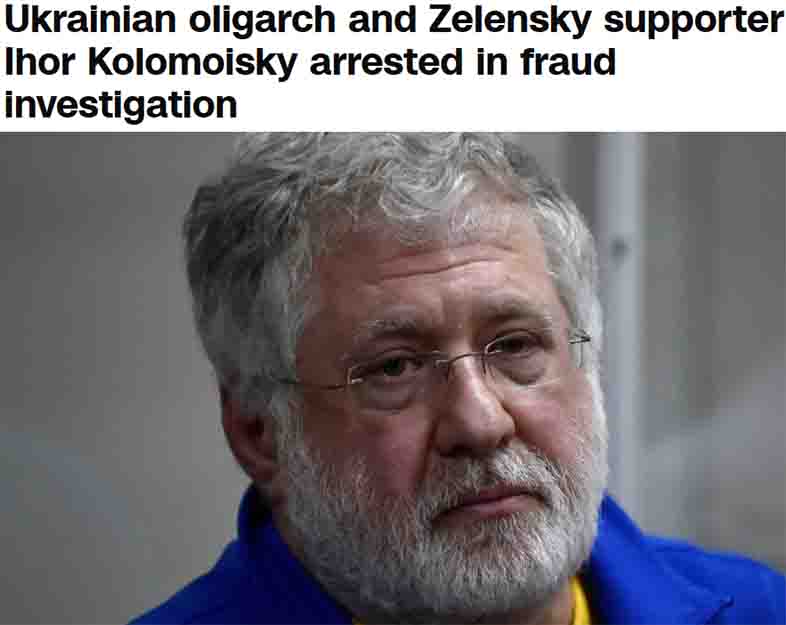
CNN, Sunday September 3, 2023
*
In a post of July 2022 – Will the real Zelenski please stand up? – I wrote:
Zelensky won in 2019 on a peace ticket to ease tensions with Moscow and give ethnic Russians in the east autonomous status, honouring a Minsk Accord Kiev had done nothing to advance. That within weeks of taking office, neo-Nazi thugs forced him, on pain of his life, to U-turn is a matter of documented fact.
But what of Zelensky’s relations with his benefactor, the most ruthless of the overnight billionaires from the ashes of the USSR? Ihor Kholomoisky was another Jew prepared to work with fascists and anti-Semites though his motive was not fear. For Kolomoisky, C14, Azov Battalion and other far right Ukraine nationalist groupings were too useful.
By year end, Angela Merkel had boasted of Minsk as a decoy; its talk of East Ukraine choosing its destiny a lie to keep Moscow negotiating while Kiev built up its military strength inside or outside NATO. This was no careless remark, picked up out of context and amplified, but one the German Chancellor made in three interviews with German and Italian media, and verified by former French President Francoise Hollande. Meanwhile in Kiev, Petro Poroshenko, installed by Washington via the Maidan Coup of 2014 which ousted Viktor Yanukovych, had already said he would not implement Minsk. Here’s the Voltaire Network – described on Wiki as “an international non-profit advocacy and alternative media organisation” – on the subject:
In an exclusive with the Kyiv Independent … Hollande backed up … Merkel. To the question “Do you think the Minsk negotiations were aimed at delaying Russian advances in Ukraine?” he replied “Yes, Angela Merkel is right on this point”.
… Poroshneko [sic] publicly declared that he would never implement [Minsk].
Only the fourth signatory, Vladimir Putin, believed in the good faith of his partners. However, the fact he approached the UN Security Council to seek adoption of Resolution 2202 endorsing these agreements implies that he no longer trusted the West and was beginning to plan for the current intervention. This resolution gives him the right, as guarantor of the Minsk Agreements, to intervene under his “responsibility to protect”.
But what are we to make of the SBU‘s arrest, this weekend, of “Zelensky’s … benefactor [and] most ruthless of the overnight billionaire oligarchs to arise, in the former republic of Ukraine, from the ashes of the USSR”?
In his post today, Moscow based American journalist Andrew Korybko offers an answer I lack the in-depth knowledge to endorse or refute, but is consistent both with known facts and elementary realpolitik. For brevity I’ve pulled out and abridged the nub of his argument:
The arrest is due to converging factors. First, the vicious blame game between the US and Ukraine last month over the failed counteroffensive. At the core of this dispute are accusations that Ukraine is ignoring US military-strategic advice [so] the US has an interest in removing those it suspects of negatively influencing Zelensky.
An assessment rather different from Washington’s was pithily made, also last month, by WSWS editor in chief David North …
A sure sign of the disastrous failure of the Ukrainian counter-offensive is the spreading of blame. The new line is that the Kiev regime did not follow US advice. In fact, Ukraine’s tragedy flows from having followed US advice to the letter.
… but that’s by the by. Andrew continues:
It’s unclear what hold Kolomoysky might still have on a Zelensky under US influence since the start of Russia’s special operation but Washington couldn’t risk him playing a role in their spat. Why arrest him only now though?
People in both countries are growing fatigued and frustrated with this conflict. The challenge for Ukraine is that it reduces support for the proxy war, plus folks are starting to remember his unfulfilled promise to fight corruption. As for the US, many Americans no longer want to fund Ukraine, or at least want accountability for their tax dollars in this infamously corrupt country.
It therefore made sense for Zelensky to finally stage a public spectacle by the arrest of his corrupt patron. He mollifies both publics and advances his political interests given newfound US pressure to hold presidential elections next spring as planned.
Zelensky will almost certainly run for re-election. He’s still somewhat popular at home, as are most leaders whenever there’s a conflict on their territory (actual or claimed) but his failure to fight corruption disappointed many. By letting the SBU arrest his former patron, Zelensky hopes to regain some of his base’s lost trust.
* * *

Zelensky is balancing on two tigers who are currently on the same path although not in step with each other. Does he not know how this fable (or is it a Limerick?) ends? Not that we should care particularly. But the path is already close to forking.